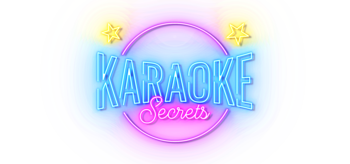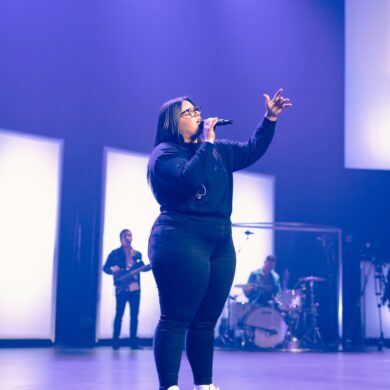Karaoke is one of the most beloved innovations of all time. Karaoke is fluid, it moves in and out of cultures and spaces, from working-class pubs to nursing homes, from middle-aged employees to giddy teenagers, from charities to brothels. Karaoke has settled itself into the smallest crevices of the globe, and we’re here for all of it!
Karaoke: Origins & History
Karaoke, like all things wonderful and whimsical, was born in the magical land of Japan. The word karaoke is a combination of the word “kara” from karappo (空) meaning empty, and “oke” (オケ) taken from ōkesutora, a Japanization of the English word, orchestra.
The word karaoke in its literal meaning of “empty orchestra” came about after an orchestra group went on strike and refused to play forcing the theatre to play music from a machine instead.
The word was then used by club musicians, referring to the act of playing a song requested by a client so the client can sing to it.
One of these club musicians at the time was Daisuke Inoue. Although he wasn’t the best musician in town, a particular customer grew fond of his sing-along style playing that he asked Daisuke to provide him musical accompaniment for a business trip. Daisuke couldn’t go along with him, so instead he provided this customer with a tape recording of his accompaniment. Thus, the birth of the karaoke we know now.
Juke-8 (The First Ever Karaoke Machine)
Although Daisuke Inoue invented karaoke, he never actually patented the karaoke machine. In his own personal account (which is both hilarious and heartwarming btw), he says how he wanted to build a machine that would play songs that allowed people to sing along.
He brought this idea to a friend and it lead to the birth of the Juke-8, the first karaoke machine. It consisted of an amplifier, a microphone, a coin box, and an eight-track stereo.
Inoue and his friends built the Juke-8 and recorded the eight songs that would be placed in the machine. The Juke-8 hit the market in Kobe in 1971. Inoue brought ten of their Juke-8s to acquaintances and with a marketing trick, the Juke-8 became a hit.
Two club owners from Kobe opened clubs in Osaka and decided to take the karaoke machine with them. Osaka propelled the karaoke boom, spreading it to Tokyo and the rest of Japan and soon enough, the rest of the world.
Karaoke History: A Timeline
1973
Daiichikosho Company Ltd. was founded. The Japanese company saw the potential of the Juke-8 and began developing their own karaoke machine.
1975
Filipino inventor and entrepreneur Roberto del Rosario, developed the karaoke-sing-along system. He put together an amplifier speaker, a microphone mixer, a tape mechanism, and a tuner into a multi-purpose sing-along machine that fit in a single cabinet casing. He patented his invention in 1983 and 1986.
1976
Daiichikosho and another Japanese company, Clairon launched their karaoke machines. Both companies began supplying the commercial market.
1980
The karaoke boom. Karaoke-machine companies began sprouting from all corners of the globe. The rapid technological advancements allowed karaoke-machine companies to become more innovative with their designs, sound quality, and ease of use.
1982
LaserDisc Pioneer, added a video component to the karaoke machine which revolutionized the design. This is the time when karaoke songs would be accompanied by cheesy and borderline absurd music-videos.
1992
Billboard published an article stating that karaoke has become a multi-billion dollar industry. It entered the U.S. and Canada through home entertainment equipment.
1992 Onwards
The rest of the 90s turned into a race between companies. They would release new features at every turn of the year, including compact-disc based systems and remote-control systems.
Karaoke: A League of Its Own
Not only has the technology that makes karaoke possible evolved, the ways in which people enjoy karaoke have also branched out into several avenues.
Back in the day karaoke bars were simply just bars that had a karaoke machine, now karaoke bars have become increasingly more creative, some totally committed to making karaoke a complete experience.
For example, the Lovenet Karaoke Bar in Tokyo Japan has themed rooms from Heaven to Clockwork Orange (yes, that kind of range). They can also house a hundred people in one room. To top it all off, they have rooms that have hot tubs – because why the hell not?
Karaoke Competitions: Stages and Battle Grounds
At its essence, karaoke is supposed to be an activity of fun, and ease, and just letting off steam. The appeal of karaoke was that it’s for everyone.
However, for people who are really into karaoke and want to even possibly turn it into a profession, karaoke competitions might just have answered your prayers.
In the early 2000s, karaoke clubs and leagues began forming in the U.S. and Australia. Karaoke-enthusiasts formed these organizations to bond over karaoke as well as to compete with other leagues. There are karaoke competitions that are organized by bars, charities, and even multi-national companies.
Just this May, Twitch announced the launch of their new karaoke game, TwitchSings, with a karaoke contest. The grand prize was a jaw-dropping $20,000 with season two of the competition topping that by adding a record deal. The second run of the contest ended in September.
There’s even a Karaoke World Championship, started in Finland in 2003 and grew to be the largest international competition for karaoke singers.
Karaoke: World Records & Hall of Fame
Every human activity comes with a handful of individuals who aspire to be the very best, if not, the weirdest and karaoke definitely has its stars.
On September 23, 2011, Leonardo Polverelli sang for 101 hours, 59 minutes, and 15 seconds straight at a charity event in Pescaro, Italy winning the Guinness Record of The Longest Karaoke Marathon.
From 2007 to 2009, China and Finland competed against each other for the Guinness World Record for the Longest Karaoke Marathon by multiple participants. In began when a group of karaoke-enthusiasts from the Chinese province of Anhui sang for 145 hours straight setting the world record in 2007. The Kouvala Karaoke Club from Helsinki beat the record that same year clocking 214 hours of singing. The back and forth continued with China always re-claiming the title. As of 2014, China still holds the record for the longest karaoke marathon by a group with 792 hours and thirty minutes.
We did not stutter, seven-hundred-ninety-two hours and thirty minutes. That’s an entire month and then some.
Karaoke Tragedies: The Dark Side of the Mic
Even karaoke, an activity that’s supposed to be about having a good time, can get twisted in the hands of the wrong people.
The most notorious case of karaoke-gone-wrong is the My Way killings in the Philippines linking Frank Sinatra’s “My Way” to at least a dozen murders between 2002 to 2012. The narrative of these crimes will usually site that a poor performance of the song led to murder. The news of the murders spread across the entire country causing karaoke bar owners and parties that have karaoke to ban the song entirely.
Several other cases of violence erupted across the world. In 2008 in Malaysia, a man was stabbed to death for hogging the microphone. In 2012, a man was shot for singing “Somos mas Americanos” (We Are More American), a song from the Mexican band Los Tigres del Norte. In 2017, a man was also stabbed to death at a wedding by another guest who did not like his performance.
Karaoke: Forever
Karaoke grew from a simple idea to a cultural sensation to an international phenomenon. In 2004, the father of Karaoke Daisuke Inoue was awarded the Ig Nobel Prize, and though the award is satirical and is said to honour trivial and unusual achievements to scientific research, we believe that he had truly invented something that changed the world forever.


